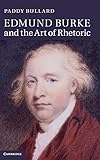Edmund Burke and the Art of Rhetoric / Paddy Bullard.
By: Bullard, Paddy [author.].
Material type: BookPublisher: Cambridge ; New York : Cambridge University Press, 2011, ©2011Description: xi, 272 pages ; 24 cm.ISBN: 9781107006577; 1107006570.Subject(s): Burke, Edmund, 1729-1797 | Political oratory -- Great Britain -- History -- 18th century | English language -- 18th century -- RhetoricDDC classification: 808.51 Online resources: Cover image | Contributor biographical information | Publisher description | Table of contents only
BookPublisher: Cambridge ; New York : Cambridge University Press, 2011, ©2011Description: xi, 272 pages ; 24 cm.ISBN: 9781107006577; 1107006570.Subject(s): Burke, Edmund, 1729-1797 | Political oratory -- Great Britain -- History -- 18th century | English language -- 18th century -- RhetoricDDC classification: 808.51 Online resources: Cover image | Contributor biographical information | Publisher description | Table of contents only | Item type | Current location | Call number | Status | Date due | Barcode |
|---|---|---|---|---|---|
 Books
Books
|
Eastern University Library General Stacks | 808.51 BUE 2011 (Browse shelf) | Not For Loan | 14879 |
Includes bibliographical references (pages 242-266) and index.
Machine generated contents note: Introduction: Burke, rhetoric and ethics; 1. The ethical turn in early modern rhetoric, 1600-1760; 2. Rhetoric in Ireland, 1693-1765; 3. The Epicurean aesthetics of Burke's Philosophical Enquiry; 4. Episodes in the evolution of Burke's eloquence; 5. Reflections on the Revolution in France and the rhetoric of character; 6. Burke, Rousseau and the purchase of eloquence; Conclusion; Bibliography; Index.
"Edmund Burke ranks among the most accomplished orators ever to debate in the British Parliament. But often his eloquence has been seen to compromise his achievements as a political thinker. In the first full-length account of Burke's rhetoric, Bullard argues that Burke's ideas about civil society, and particularly about the process of political deliberation, are, for better or worse, shaped by the expressiveness of his language. Above all, Burke's eloquence is designed to express ethos or character. This rhetorical imperative is itself informed by Burke's argument that the competency of every political system can be judged by the ethical knowledge that the governors have of both the people that they govern and of themselves. Bullard finds the intellectual roots of Burke's 'rhetoric of character' in early modern moral and aesthetic philosophy, and traces its development through Burke's parliamentary career to its culmination in his masterpiece, Reflections on the Revolution in France"--


There are no comments for this item.